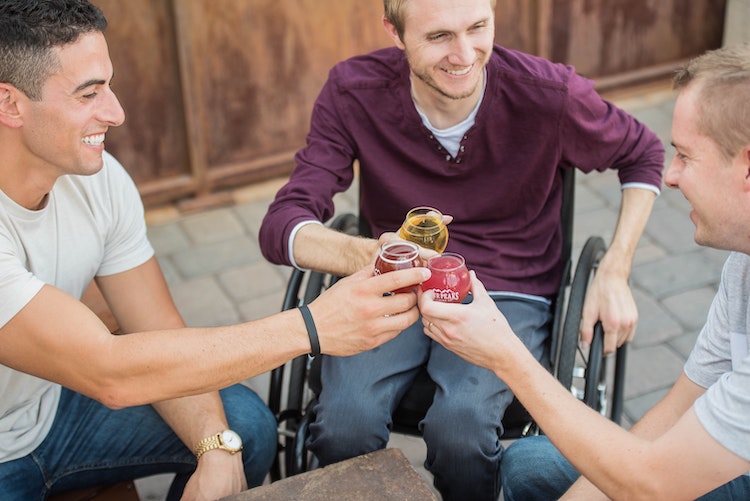
How should we go about explaining disability to children? My view is that it should be honest, start early and be rooted in a basic position of empathy and respect.
This snapshot below is one of my favourite photos. It’s my older brother Ross, and a chap called Michael. It’s a special picture because both Ross and Michael passed away within a couple of years of this picture being taken, and it reminds me of some really happy times.
My adoptive parents were residential social workers and so I’ve always known and worked with people with moderate to severe physical and learning disabilities. When I was at uni, Ross and I used to take groups of adults who lived in my Mum’s care home on holiday. This photo was taken on a holiday in Scotland, in the same place where our whole family stayed when we were kids.
Michael was one of our longest-standing residents. He could be very loving and had a wicked sense of humour, but he was stubborn as a mule, and could fly into a fury if you asked him to do something he wasn’t keen on. He loved to spend entire days copying words and letters out of books, and his favourite thing to watch on TV was nature documentaries – he loved animals.
Like many men of his age with Down Syndrome, Michael spent many years in a hospital. His speech was poor because he was born at a time when it was thought ‘kinder’ to remove the teeth of people with Downs rather than subject them to the trauma of dental care. But he was able to communicate, using a combination of sounds and Makaton sign language.
I suppose what I’m saying here is that Michael was a person. Just like you and me. One of the things about Michael was that he had Down Syndrome. But there were a million things that made Michael, Michael, and the disability was one small part of who he was.
Michael was very happy, but he looked and sounded different to most people. When you knew him, it was easy to forget about, but strangers would often stare. But what used to upset me far more than that was when people would steer their children away from us in the supermarket, or tell their children not to look.
I’m sure, looking back, those parents had the best of intentions, but I still think they were teaching their children that disability was at best embarrassing and not to be talked about, or at worst, frightening. Why is this?
How to Explain Disability to Children
Luckily, these days, kids don’t have to look far to see examples of disability in the media. There are actors in shows who use wheelchairs, there are puppets on Sesame St who have autism, and kids TV presenters with facial differences and limb differences.
There’s an argument that the inclusion of disability in the media often focuses on milder disabilities – but this imperfect representation does at least provide a starting point for conversation with children.
So the first thing to remember when explaining disability to children is that kids are going to see disabilities. This is completely normal, and doesn’t require a big emotional reaction. Meeting someone with a disability is the same as meeting someone with any sort of difference – it’s perfectly fine to notice someone is different, but we treat everyone with the same respect. If we model this behaviour as parents then it’s going to become second nature to children.
Don’t Pity Disability, Address the Inequality
Sometimes that might mean confronting our own discomfort around disability.
As a parent, I do feel thankful that my child was born without a genetic condition or disability or chronic condition. I’m glad that she won’t need the additional treatment or challenges that so many people need to face. That’s a natural human feeling. But that’s not the same as feeling sorry for people with disabilities.
Rather than saying, “Poor Sarah” because Sarah uses sticks to help her walk, we can say:
“We use our legs to walk around, but Sarah’s legs are different, so she uses a wheelchair.”
We can also say:
“Isn’t it annoying that we can get into this building but Sarah can’t, because of these steps? Isn’t that unfair?”
I make a point of pointing out modifications that can easily be made to buildings, or crossings, or shop till heights – and I’ll say, “Isn’t it annoying that everyone doesn’t do that?” or “Don’t you think everyone should be able to read that menu?”
We might point out the different accommodations we can make in homes and public spaces to help people with disabilities do more things for themselves. My Dad is blind and uses a mobility aid, so we are used to checking access statements before we visit places, and it’s a great way for Flea to see what CAN be done, and what so often ISN’T.
Avoid using generalisations
I do try really hard to teach Flea that disability is just part of some people’s lives, and it doesn’t stop them being smart, or funny, or kind, or – in some cases – bad-tempered old gits. And also just talking about “disability” like it’s one massive group of similar people is WEIRD.
I think there’s a balance to be struck between being sensitive to someone’s disability and remembering that they’re not JUST a disability – there’s sometimes a tendency to talk about “Downs people” always being sweet for example or “autistic people” always being unable to cope with conversations. Obviously life isn’t that simple!
Ask Questions but do the Work
If Flea is staring at someone or asks why they look different, or don’t walk, I tend to try and explain openly, about what that person’s disability might be. Note, I don’t think it’s appropriate to approach any person with a disability and ask for an explanation. Would you ask someone without an obvious disability to explain a medical trauma or accident they might have experienced?
I’ve found often that people will talk to children directly and explain why they look a bit different, or can’t do the same things as her, if Flea is talking to them anyway. But if not, there are plenty of books and videos on YouTube that can help you when explaining disability to children, and to understand the issues around disability.
I’m not sure this is the right approach when explaining disability to children – it’s just the one that seems most respectful to me, based on my own experiences. I’d be really interested in your tips on this – how did you introduce the idea of disability and difference to your children? Do you find it difficult to know how to strike the right balance?




